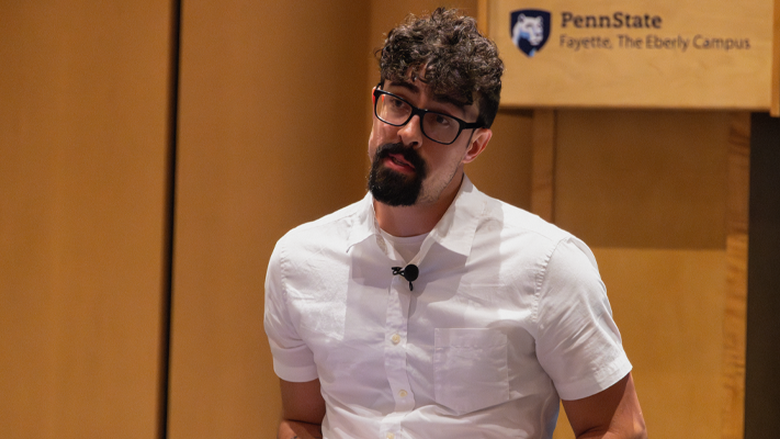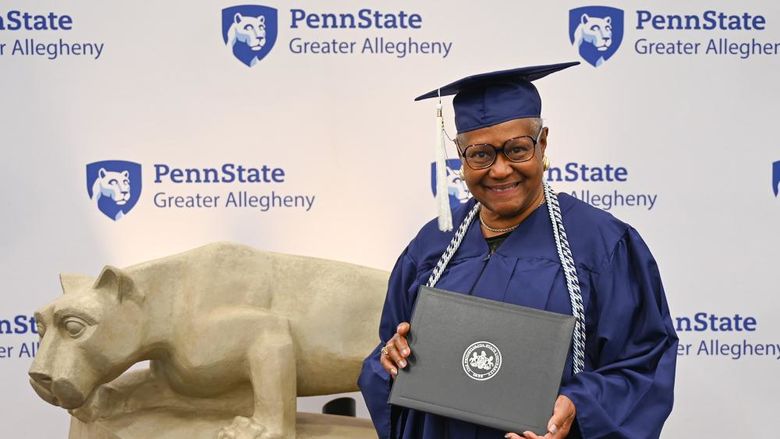MCKEESPORT, Pa. — “Cinema is about the future,” said MaryEllen (Ellie) Higgins. “Even when films are set in the past, they are often contemplating at the past and asking ‘What’s wrong with this?’ ‘Is it still happening?’ It helps you reflect — not fixate — on the past and to imagine something beyond.”
Higgins, associate professor of English at Penn State Greater Allegheny, attended the Africa in Motion Film Festival in Glasgow and Edinburgh, Scotland, where she served as a panelist at a symposium on curating global film archives and, in particular, on the “silt” of these archives.
The “silt” of the global film archives, as described by Higgins, are the films that have been out of circulation. However, these forgotten films have the potential to unlock a greater understanding of humankind’s history and to spark creativity in the present.
“When we ask ourselves why it’s important to revisit this archive of early films from Africa, the question should really be ‘What do these images from the past say about our present and future?’” said Higgins.
The Africa in Motion Film Festival helped Higgins “think in circulation,” see newly restored films and become inspired by the passion of individuals who have devoted their careers to protecting these films.
“The directors who were present were very accessible,” said Higgins. “It’s different than the larger film festivals. People at Africa in Motion are open and enthusiastic about sharing their ideas in intimate settings. It doesn’t happen very often that scholars, archivists, curators, directors, aspiring filmmakers and historians all get together for dinner to talk about films.”
“I really think getting people together from different places that have different points of view and have lived different experiences is a really invigorating, cool way to tackle an issue,” said Higgins.
But the importance of cinema was not always obvious to Higgins, let alone the importance of Africa’s role in cinema history.
“My interests began in French and English literature, which transformed into an interest in African literature and African screen media,” said Higgins. “I didn’t even see any African films until I was a graduate student. Then I realized something really great was going on in cinema. I’ve been writing about it ever since.”
Higgins has applied her passion of film to researching how large groups of people use the medium to heal from devastating situations.
“At the moment, I am writing a book on how cinema renders traumatic experiences and memories,” said Higgins. “Those kinds of experiences become collective memories, so I ask, ‘What understandings does this bring about traumatizing structures? How does it help us to see and hear?’ I hope that the book will inspire some globally minded thinking.”
Africa has had its share of traumatic experiences. Colonialism, crushing debt, civil war and genocide are among the most distressing situations Africans have faced.
“I’m interested in how African artists and directors help us to understand collective traumatic experiences,” said Higgins. “Several African directors are creating a space for collective healing.”
“I think these lost classics prompt us to think about the legacy of colonialism,” Higgins added. “But it’s not just about that. These films serve many purposes. They get us to think about local and international politics. They are interested in aesthetics, new film languages, in reinventing cinema.”
“How does seeing a film by African directors that are filmed in Africa influence our understanding of history?” asked Higgins. “Most early films set in Africa were not made by Africans. The image of Africa that gets repeated in Hollywood movies is based on a fantasy. It is important for directors to produce their own views of their own places. It’s not about someone else’s fantasy, it’s about what is important to them.
“It’s the difference between telling your own story about yourself rather than others telling your story for you. These lost classics tell us a lot about that phenomenon.”




